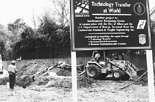


Personal and financial dilemmas have plagued more than one mom-and-pop gas station owner faced with the costs of replacing or remediating leaking underground fuel tanks. According to Read Miner, a regulator with South Carolina's Department of Health and Environmental Control, more than 3,800 such sites have been identified in South Carolina alone. The American Petroleum Institute estimates that cleanup costs range between $350,000 and $400,000 per site nationwide. State trust funds, frequently created from consumers' gasoline taxes, just can't stretch far enough to meet the needs of struggling owners—especially mom-and-pop owners.
But now, thanks to a U.S. Department of Energy Savannah River Site cleanup technology that's been scaled down for use at gas stations, that outlook may change. The new technology, called PHOSter, controls just the right amount of phosphorous that needs to be added to the soil to stimulate the naturally occurring aerobic bacteria that "eat up" volatile organic compounds, such as benzene, toluene, or naphthalene. It can also be used to stimulate the anaerobic bacteria that break down the more difficult chlorinated solvents. The PHOSter system is not only beginning to prove its merits in reducing contamination, but showing it can do so faster and at a lower cost than traditional technologies.
"With the huge number of sites across the country, it becomes more and more apparent that we have to find better ways of corrective action," said Miner. "If we can consider innovative technologies that will do a job for say, one fourth the cost, we can do four times more cleanups with a corresponding reduction in health risk to the people. That's a situation where everyone wins."
Many people already feel like winners in Aiken, South Carolina, where PHOSter was recently used to remediate the soil under what used to be Jimbo's Gas 'n Goodies. Located in the middle of downtown Aiken, the property had been abandoned and eventually was acquired by the city. About the time the city decided to tear down the gas station building, the Aiken Chamber of Commerce was engaged in a search for new property where they could expand to meet the needs of growing membership and establish a visitor's center.
Meanwhile, technology commercialization experts at Southeastern Technology Center in Augusta, Georgia were looking for a site where PHOSter could be demonstrated. STC had teamed with Frisby Technologies, Inc. of Aiken to develop commercialization plans, and with Freeman & Vaughn, a small engineering firm in Augusta, to downsize the PHOSter bioremediation equipment system and tailor it for use at small gas station sites. Now STC wanted to find a site where the demonstration would help a community and hold potential payoff for the regional economy. "The whole technology commercialization philosophy was not just to make money but to help someone who had to spend money to spend less of it. We saw the mom-and-pops as those who really needed help," said Marc Ghetti, Freeman & Vaughn environmental engineer.
With that end in mind, Jimbo's became an ideal demonstration site. If the property could be cleaned up, the Aiken Chamber of Commerce would consider buying it. "It was one of the best sites in town, as we looked for access and visibility," said Doug Henderson, chair-elect of the Aiken Chamber of Commerce. "We didn't want to take existing retail space or parking space. This spot was ideal, but we didn't want to buy it without a clean bill of health."
 Recognizing
the important role that South Carolina regulators would play, STC
arranged a meeting between Freeman & Vaughn and Read Miner
and other SC DHEC regulators before the demonstration began. As
Miner recalled, "They introduced the technology to us in a
very thorough manner and then asked about our concerns. It really
helped to get everything upfront in the beginning."
Recognizing
the important role that South Carolina regulators would play, STC
arranged a meeting between Freeman & Vaughn and Read Miner
and other SC DHEC regulators before the demonstration began. As
Miner recalled, "They introduced the technology to us in a
very thorough manner and then asked about our concerns. It really
helped to get everything upfront in the beginning."
Ghetti added, "We've done a lot of work for clients in different states, and I guess we've learned to talk with the regulators first before we start a project. Simply filling out papers doesn't give them the information they need. We must prove we are competent and have the ability to apply a technology. It takes face-to-face interaction to communicate that."
With regulators on board, the work got underway. "They
did a good job demonstrating a reduction in contaminants,"
said Miner. "They also offered a remedial action plan, so we
discussed what approvals were necessary." With the
remediation now taking place sooner than was anticipated, the
Aiken Chamber of Commerce is waiting only for a letter of
"no further action" from SC DHEC before it finalizes
plans for a new 6,000-square-foot building.
Ghetti is hiring new staff to meet the demand for work that
PHOSter is creating. "Some of these new hires are displaced
Savannah River Site employees, which brings the technology dollar
investment full circle," he said. Ghetti's contract work is
coming from at least five other states and from as far away as
Nigeria.
Commenting on the value of investment in new technologies, Miner said, "Lots of people are scared of new technologies, because they think they'll take jobs away. But with as many sites out there as there are, there'll be plenty of work for everyone. The more innovative technologies, the better; because not every technology is best for every site. The more you can choose from, the better."
![]()
![]()
![]()